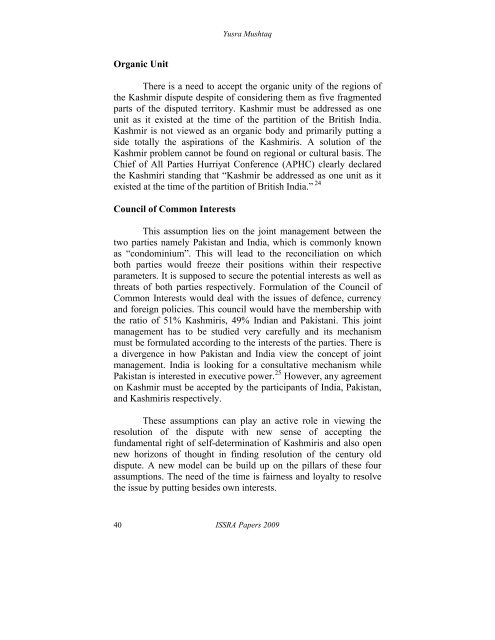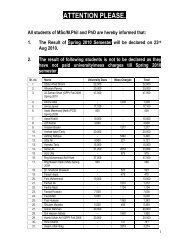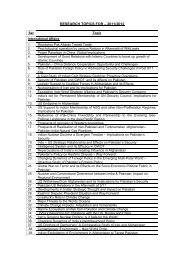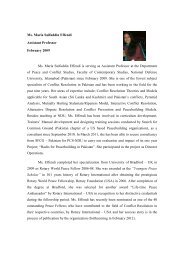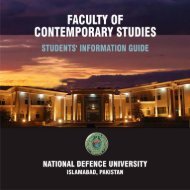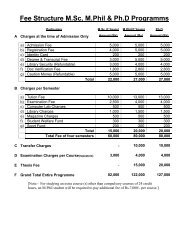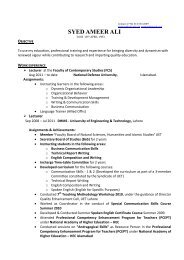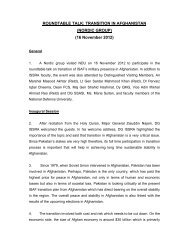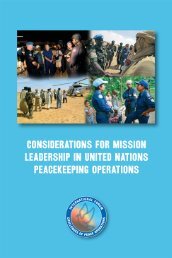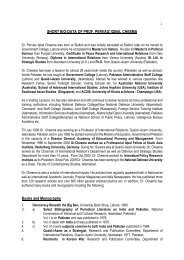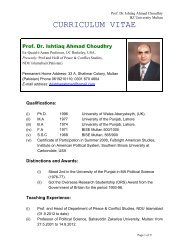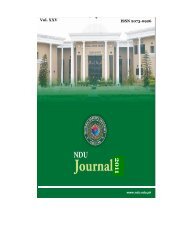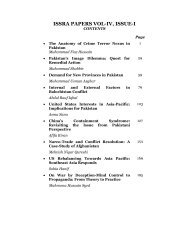issra papers vol i, 2009 - National Defence University
issra papers vol i, 2009 - National Defence University
issra papers vol i, 2009 - National Defence University
Create successful ePaper yourself
Turn your PDF publications into a flip-book with our unique Google optimized e-Paper software.
Yusra Mushtaq<br />
Organic Unit<br />
There is a need to accept the organic unity of the regions of<br />
the Kashmir dispute despite of considering them as five fragmented<br />
parts of the disputed territory. Kashmir must be addressed as one<br />
unit as it existed at the time of the partition of the British India.<br />
Kashmir is not viewed as an organic body and primarily putting a<br />
side totally the aspirations of the Kashmiris. A solution of the<br />
Kashmir problem cannot be found on regional or cultural basis. The<br />
Chief of All Parties Hurriyat Conference (APHC) clearly declared<br />
the Kashmiri standing that “Kashmir be addressed as one unit as it<br />
existed at the time of the partition of British India.” 24<br />
Council of Common Interests<br />
This assumption lies on the joint management between the<br />
two parties namely Pakistan and India, which is commonly known<br />
as “condominium”. This will lead to the reconciliation on which<br />
both parties would freeze their positions within their respective<br />
parameters. It is supposed to secure the potential interests as well as<br />
threats of both parties respectively. Formulation of the Council of<br />
Common Interests would deal with the issues of defence, currency<br />
and foreign policies. This council would have the membership with<br />
the ratio of 51% Kashmiris, 49% Indian and Pakistani. This joint<br />
management has to be studied very carefully and its mechanism<br />
must be formulated according to the interests of the parties. There is<br />
a divergence in how Pakistan and India view the concept of joint<br />
management. India is looking for a consultative mechanism while<br />
Pakistan is interested in executive power. 25 However, any agreement<br />
on Kashmir must be accepted by the participants of India, Pakistan,<br />
and Kashmiris respectively.<br />
These assumptions can play an active role in viewing the<br />
resolution of the dispute with new sense of accepting the<br />
fundamental right of self-determination of Kashmiris and also open<br />
new horizons of thought in finding resolution of the century old<br />
dispute. A new model can be build up on the pillars of these four<br />
assumptions. The need of the time is fairness and loyalty to resolve<br />
the issue by putting besides own interests.<br />
40<br />
ISSRA Papers <strong>2009</strong>


